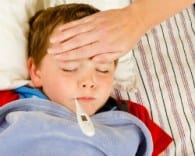Diagnosing and Treating the Flu in Children
Your normally overactive four-year-old doesn’t seem quite himself over the past two hours. He has had a runny nose and a bit of a cough. He then begins to complain of a headache and sore throat. Next, his body aches all over, and he insists on laying down. You take his temperature, which reads 103.5! His cough gets worse and he starts vomiting. The most common bug out there that can cause such a plethora of symptoms – is the FLU. The flu is a virus (called influenza). It is therefore not treatable with antibiotics but these steps can be taken for flu prevention. Follow our guide for diagnosing and treating the flu in children.
Twelve Symptoms of the Flu
The flu in children will usually cause three or more (or all) of the following symptoms:
- High fever, chills
- Sore throat
- Headache
- Nausea
- Vomiting
- Diarrhea
- Abdominal pain
- Body and muscle aches
- Stuffy nose
- Clear or green runny nose
- Cough – dry or productive
- Irritated, red eyes
Getting Through The Night
If you think your child has the flu, the first step is to relax. Don’t worry. Here are some guidelines to help you and your child get through this illness:
Treat the Symptoms
Decide which symptoms are bothering your child the most, and focus on treating those. For example, ibuprofen for head and body aches and fever, a cough medicine if needed, a nasal decongestant if needed. It is safe to mix these three types of medicines. Alternatively, you can give a multi-symptom cold and flu medicine that treats a variety of symptoms.
Drink Lots of Fluids
Staying hydrated helps keep the mucus running to avoid sinus and ear infection.
Multi-Symptom Cold Medicine
Give children six years of age and older a cold medicine that relieves several of the main symptoms that he is having such as headaches, stuffy nose, cough and fever. This mix of three or four medicines in one is generally a bit too much for kids under six, however. Children younger than six can use one or two medicines for the worst of the symptoms.
Ibuprofen
This can provide relief for the aches and pains of the flu in children.
Warm Bath or Hot Water Bottles
These can relieve muscle and body aches.
Prescription Anti-Viral Medications
Periodically a new drug comes out that can treat the flu in children. They are like an “antibiotic for the flu virus.” These medications can do two things – shorten the duration of the illness and lessen the symptoms. It must be started right at the beginning of the flu to be effective. They are generally only for children 12 and older.
When to Worry About the Flu in Children
Many parents have heard about people dying from the flu. This can be very worrisome to any parent when their child is going through the worst of the symptoms. People don’t actually die of the flu virus; they die from complications of the illness such as pneumonia or dehydration. This virtually never occurs in children and healthy adults. Elderly people are the most susceptible to complications. These complications usually don’t occur until late into the illness, not during the first few days.
There are generally only three situations that might necessitate a call to your doctor or a visit to the ER during the night:
High Fever
Most high fevers don’t require a call to your doctor after hours. Click here to help you determine if your child’s fever warrants a call to the doctor.
Dehydration
Most children will get mild to moderately dehydrated during the flu. Click on here to help you decide if your child is severely dehydrated and needs a call to the doctor or ER visit.
Severe Headaches
If your child has a severe headache with a stiff, painful back-of-the-neck and persistent vomiting. These could be symptoms of meningitis.
When to Visit the Doctor for the Flu in Children
Most children with the flu don’t even need to see a doctor. Here are some guidelines to help you decide if a doctor’s visit is warranted:
- Fever more than four days – while this may still be just the flu, it’s best to double check with your doctor.
- Moderate to severe dehydration
- You have a gut feeling that your child is unusually ill
- Severe cough with chest pain AND shortness of breath – This may mean pneumonia is setting in.
Dr. Sears advises: When it’s only “the flu” as with most viruses the fever fluctuates from very high to normal and your child feels much better when the fever is down. With more serious infections the fever usually stays high (above 102º) and the child seems sick or sicker during most of the illness – although this fever pattern clue is not always diagnostic.

